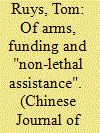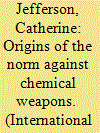| Srl | Item |
| 1 |
ID:
025427


|
|
|
|
|
| Publication |
New York, Simon and Schuster, 1983.
|
| Description |
342p.
|
| Standard Number |
067144073X
|
|
|
|
|
|
|
|
|
|
|
|
Copies: C:1/I:0,R:0,Q:0
Circulation
| Accession# | Call# | Current Location | Status | Policy | Location |
| 024698 | 355.825119/TSI 024698 | Main | On Shelf | General | |
|
|
|
|
| 2 |
ID:
134205


|
|
|
|
|
| Publication |
2014.
|
| Summary/Abstract |
In spite of legal objections, the European Union (EU) in May 2013 gave the conditional green light for the transfer of arms to the Syrian Opposition Council. The EU's decision is not a solitary move. Several other States, including Russia, the United States, Qatar and Saudi Arabia, have provided arms, funding and/or "non-lethal assistance" either to the Syrian government or to rebel forces combatting the Assad regime. The present contribution aims to shed light on the legality of such assistance. On the one hand, it assesses legal objections related to the fact that third-State assistance is used for the commission of widespread war crimes and human rights violations. On the other hand, it examines the compatibility of such assistance with the non-intervention principle and, in so doing, examines to what extent the latter principle discriminates between de jure governments and non-State armed groups in the context of a civil war.
|
|
|
|
|
|
|
|
|
|
|
|
|
|
|
|
| 3 |
ID:
131443


|
|
|
|
|
| Publication |
2014.
|
| Summary/Abstract |
The use of chemical weapons in Syria in August 2013 led to calls for a tough international response in order to uphold the norm against what is often portrayed as a particularly odious form of warfare. The condemnation of poison weapons has a long history and this article examines the origins of the international norm against their use. It focuses particularly on the proceedings of the first Hague Peace Conference and suggests that this represented the emergence of an important distinction between the customary norm against poison and poisoned arms, and a newly codified norm against the use of asphyxiating gas projectiles, which was primarily an attempt to limit the potential of new weapons technologies. However, psychological responses to the wide-scale use of chemical weapons in the First World War underscored a deep revulsion to this form of warfare and blurred the distinction between gas projectiles and poison. While the Hague Conventions ultimately failed to avert the use of chemical weapons, the formation of the 1925 Geneva Protocol reaffirmed the norm against the use of poison in war and represented both a legal and moral condemnation of chemical and biological weapons that continues to be enshrined in international law today.
|
|
|
|
|
|
|
|
|
|
|
|
|
|
|
|